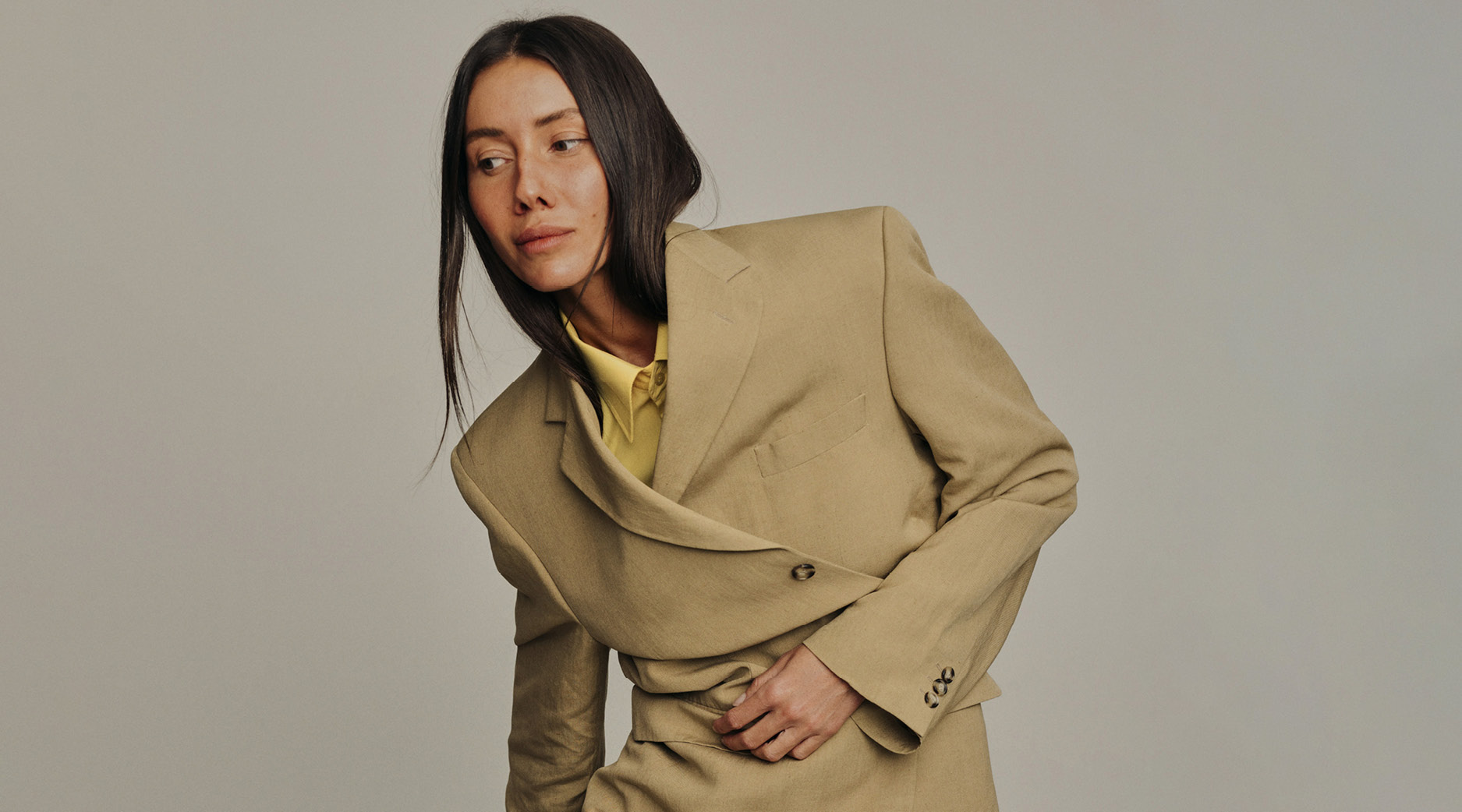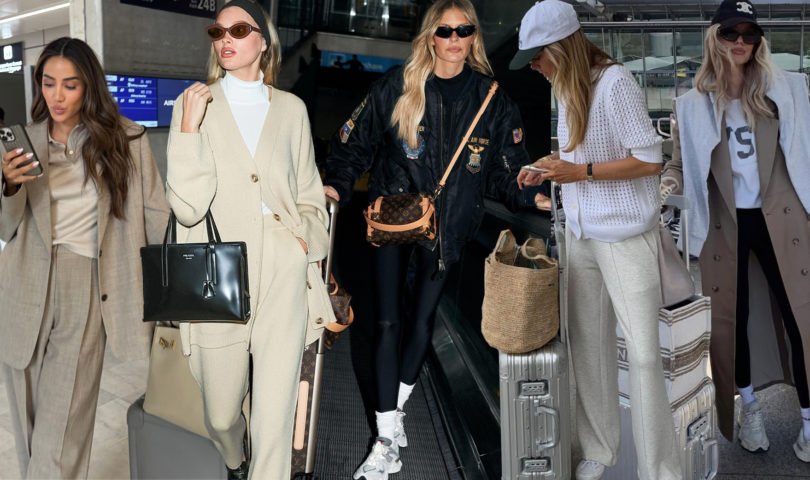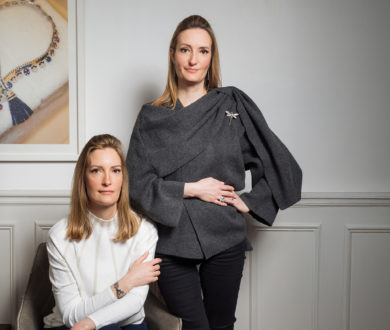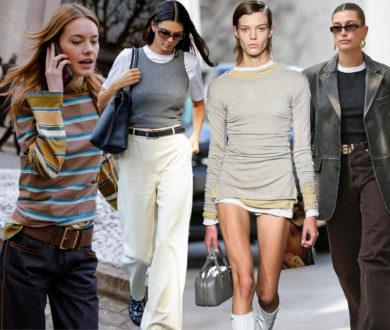Julie Pelipas is talking to me from London, but it’s not her home. And while home is only a three-and-a-half hour flight from London, returning right now is not an option. Pelipas, the former fashion director of Vogue Ukraine and founder of upcycled clothing platform, Bettter, is one of the roughly 12 million Ukrainians who have been forced to flee their country since its invasion by Russian forces in February, with millions more displaced within Ukraine, and hundreds of thousands left without any home at all. Considering the circumstances, Pelipas is one of the lucky ones, but talking to her, it’s clear that the emotional toll of war has weighed heavy.
“I’m safe but I feel enormously tired,” Pelipas says when we first speak, “it’s not easy to work normally and live life while trying to handle the huge mental pressure of everything we see happening in our country every day… particularly now that the media has stopped covering Ukraine as much.” For Pelipas, London is a haven, but it will never feel the same as the dream home she had meticulously designed and only recently moved into, set in the heart of Kyiv and surrounded by beautiful gardens and a sparkling river. If anything, the rushed relocation of her and her family has only made her appreciate her country more. “I love my country, I love my people,” she tells me, explaining how she recently went back for a visit, surprised to find that the people there were choosing to continue on as normally as they could. It’s a testament to the incredible resilience that has defined the Ukrainians’ retaliatory fight and utter refusal to back down. “Being back in Ukraine was a very surreal experience,” Pelipas explains, “there are parts that feel so normal but you can be killed at any moment… when we were shooting for Bettter’s MRIYA project with Dover Street Market, rockets hit the city centre, about two-kilometres from our studio.” This comes as Russia is reportedly ramping up its attacks on Ukrainian civilians, a result of what Pelipas says, is an attempt to break their spirit. “There’s no military logic anymore,” she tells me, “they’re trying to lower our bravery, they want us to be scared.” But, fear, I learn, is not in Julie Pelipas’ vocabulary.
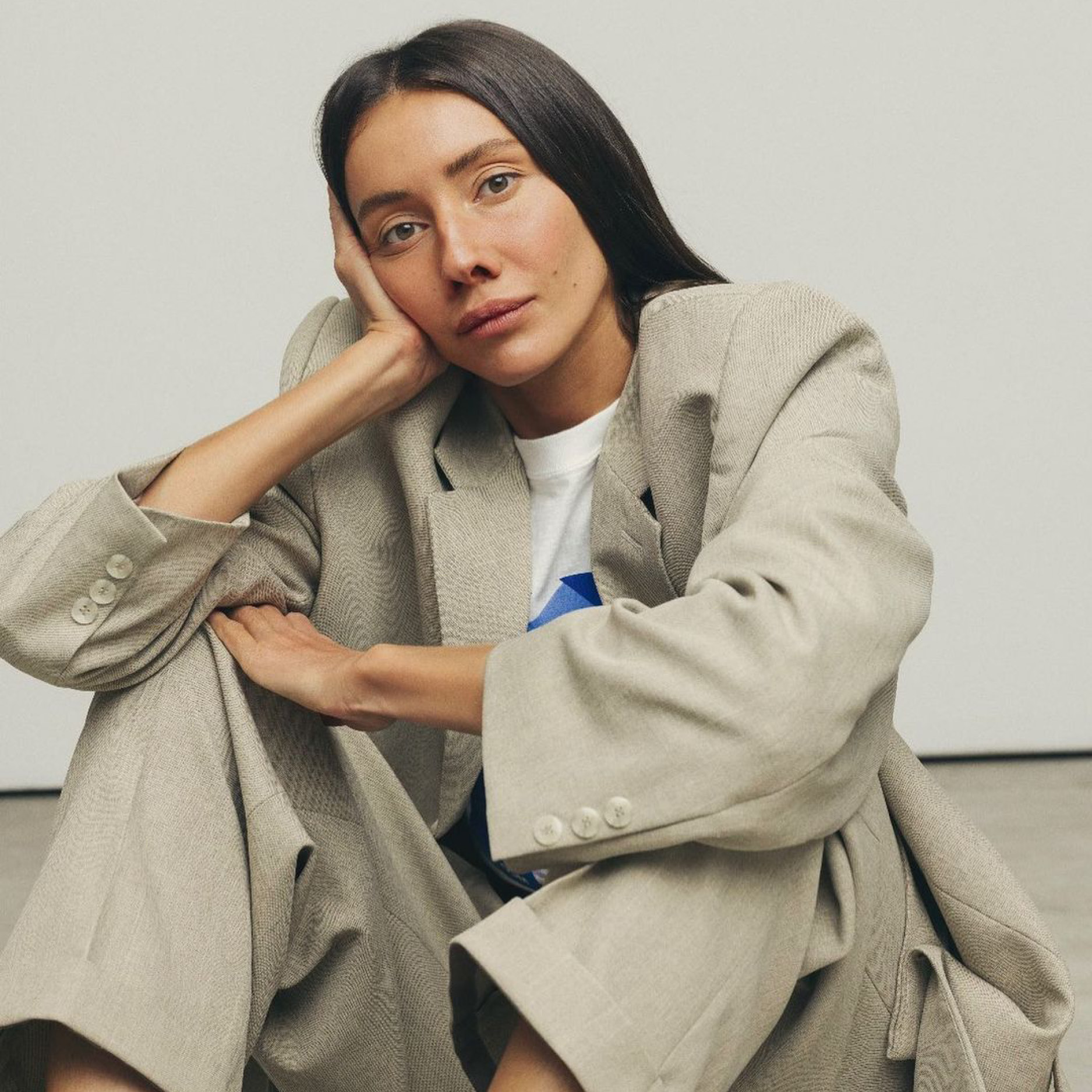
For those of you who haven’t heard of Julie Pelipas, there is a high chance you’ll have seen a photo of her on Instagram, probably at fashion week, probably surrounded by photographers. Tall and slender, with a strong, memorable face and a particularly elegant way of dressing (usually in a suit), Pelipas has long been the subject of ardour from those in the fashion industry — as much for her personal style as for the globally-renowned work she has produced over her decades-long career. An integral part of the teams that set-up both Harpers Bazaar and Vogue in Ukraine, Pelipas has, since her earliest days in fashion, been an advocate for creatives in her country — magnanimously giving them a platform in print to publish their work, opening doors for them internationally and encouraging them to push the envelope and to rewrite the traditional editorial rules. It is something that has underpinned much of her work, and now, she tells me, is more important than ever.
“At Vogue, we really didn’t have any budgets,” Pelipas explains, “so we used to pay young, local creatives with the freedom to do whatever they wanted, which saw most of them take incredible risks to produce these beautiful shoots and covers for us.” Indeed, the covers released under Pelipas’ tenure at Vogue Ukraine redefined the style for publications the world over. They were pared-back and artistic, often anchored by an overarching or esoteric theme that lent them the kind of depth and gravitas that other fashion titles were sorely lacking. Importantly, they also thrust Ukraine into the international fashion spotlight, showcasing the country’s burgeoning industry, and giving it an impetus for growth.
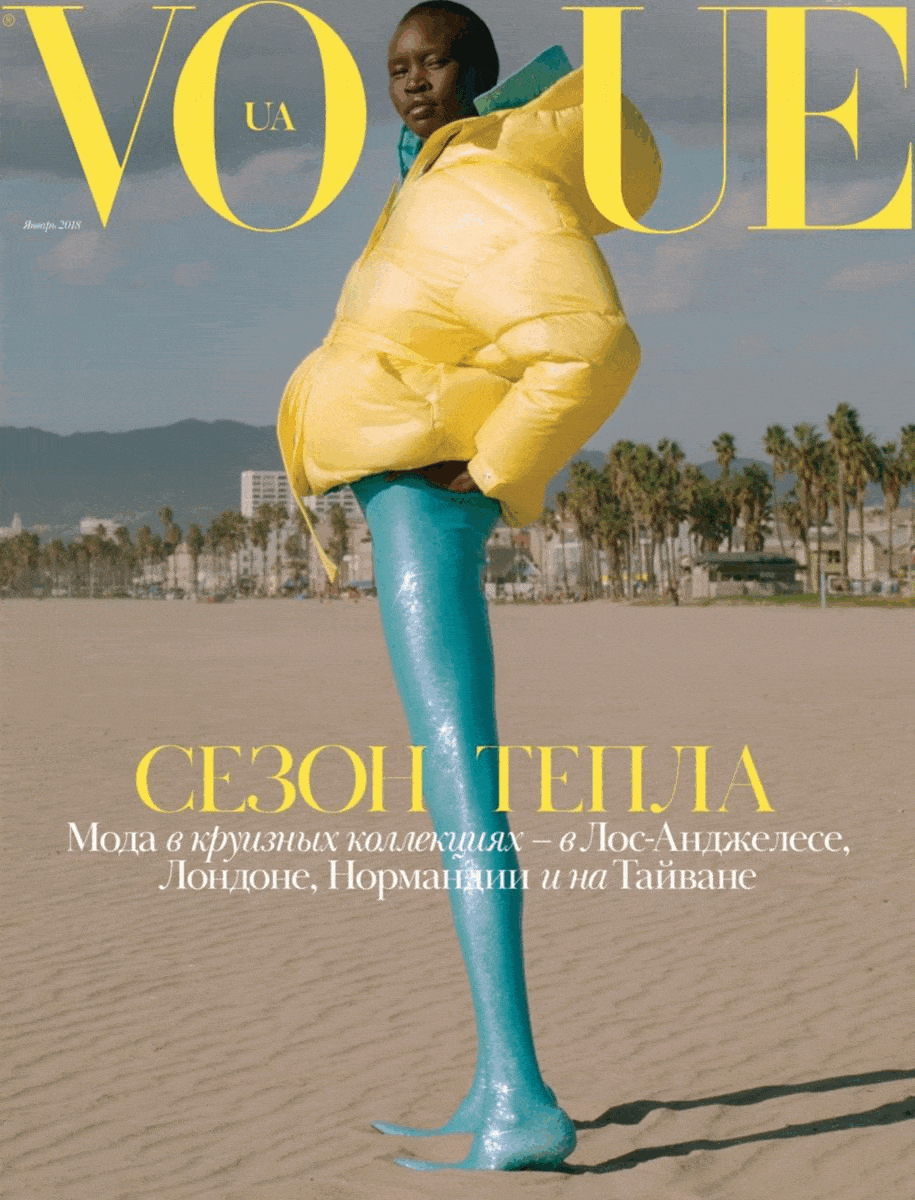
Through her experiences building Vogue Ukraine into the visually-renowned and globally-replicated magazine it now is, Pelipas was able to hone a unique ability to create greatness out of virtually nothing, explaining how in the early days of Vogue, not only was there no local industry (aside from models, of course) but no international brands or creatives were interested in working with them. It was only due to some scrappy determination, as well as a clear vision and the decision to never take ‘no’ for an answer, that Pelipas and her team were able to build Vogue’s reputation and bring Ukraine’s talented pool of designers to the world. “A lot of people didn’t even know what Ukraine was in the beginning,” she says, with a laugh, “but when we started producing all this different content and changed our covers, I remember being in Paris at a dinner for International Condé Nast editors and Jonathan Newhouse said to everyone in his speech, ‘have you all seen the amazing work that Vogue Ukraine is doing with their artistic covers?’ It was such a proud moment because we had worked so hard for so long and we were finally getting recognition.”
Because far from the glamorous world that ‘Vogue’ might conjure, those years, Pelipas explains, were marred by a level of dedication and grit that really eclipsed anything else in her life. “When you are working with no budgets, no connections, no system behind you, you dedicate yourself completely to your work… you have to put in extraordinary hours to get extraordinary results,” she reveals, “I was sleeping in the office some nights… I lost a lot, and I missed a lot of things in my life but it really turned me into a person who wasn’t afraid of anything. After that, anything felt possible.”

For Pelipas, who I discover is deeply empathetic, with a disarming authenticity and a particularly strong moral compass, the work at Vogue started to feel like it no longer aligned with her values. “I realised that I couldn’t serve this classic system anymore,” she explains, “I wasn’t bringing happiness to people but really, just the opposite, because at its core it was all about telling people that they weren’t good enough or skinny enough or trendy enough… and I felt a responsibility around the messages we were sending.” Sustainability was one issue that Pelipas tells me she pushed to cover more consistently at Vogue, despite it often being shut down for fear that raising the idea on a cover would do nothing for magazine sales. “I wanted to talk about sustainability in a really honest way, without all of the greenwashing,” she says, “because when I would travel for fashion weeks, and go to the trunk shows and the showrooms, I would see so many clothes and how similar they all were and the amount of deadstock that was left behind… so I started thinking about how we could stop producing so much while still creating beautiful clothes with that timeless quality that our parents’ generation had… that was where my idea for an upcycling system began, and it was in my head for three years before I decided to quit Vogue and do my own thing.”
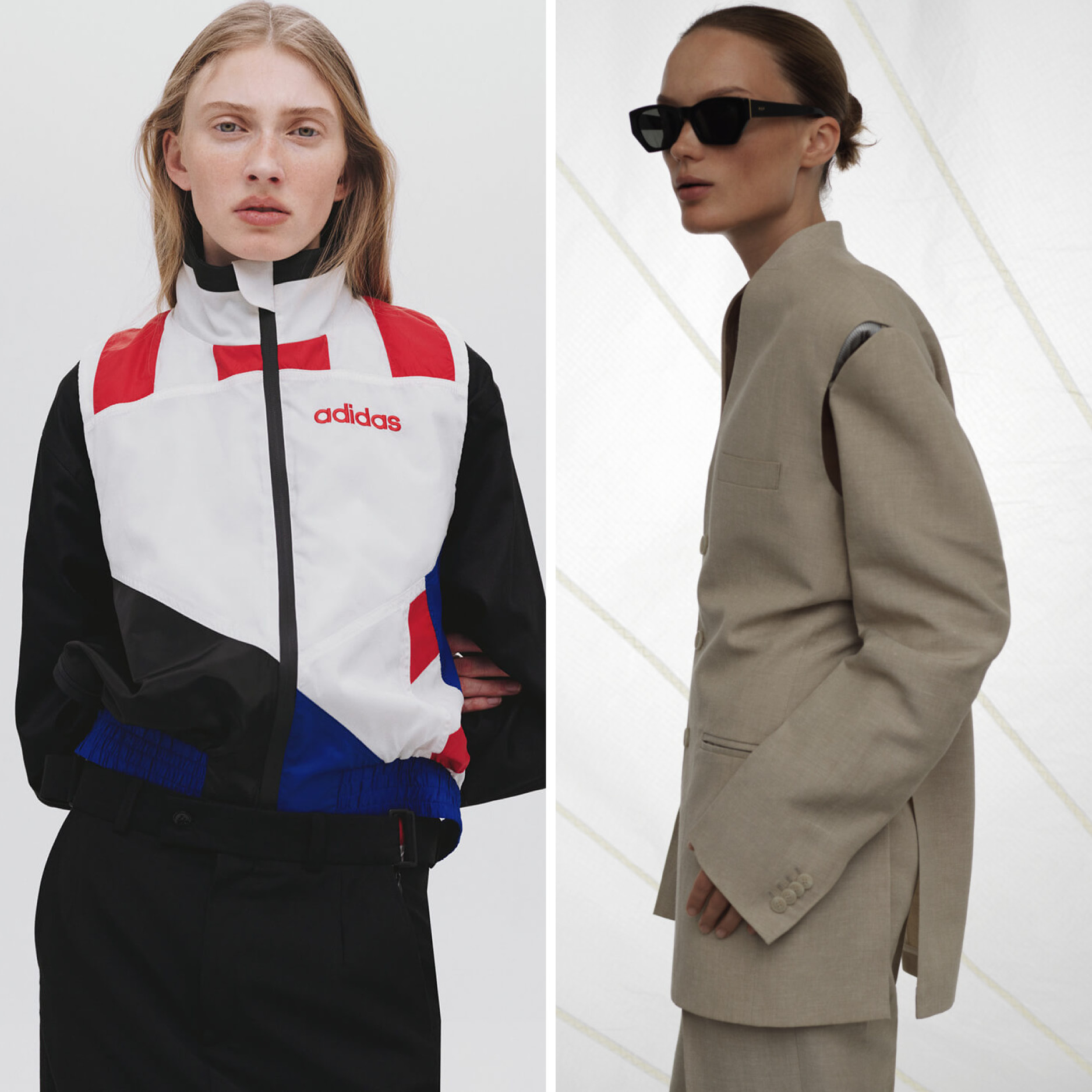
That thing was Bettter, a company reimagining our current fashion system and now, Pelipas’ main focus. Bettter identifies itself, not as a fashion brand, but is a multifaceted platform based around the idea of upcycling. For Pelipas, it was the only feasible way to combat the rampant over production she had witnessed over her years in publishing — years that instilled in her a belief that all the clothing we need has already been produced. So, she founded Bettter as a way to take deadstock and vintage textiles — including men’s suiting, old athletic-wear and even beach towels — and repurpose them into sleek, beautifully-made contemporary clothing with quality, cut and fabrication at the forefront. “I hope that Bettter will become a system that can change global production,” Pelipas tells me, “upcycling is transparent and truly a green technology…and the idea behind it is actually very old, much like mending or patching clothes.”
To look at Bettter’s collections is to see Pelipas’ unmistakable aesthetic stamp. The suits have that Phoebe Philo-esque androgenous quality (perfectly proportioned and effortlessly chic) while the more casual pieces are all made with a tailored edge. Crucially, Bettter stands apart from its ‘sustainable fashion’ contemporaries for the way in which it eschews catchy marketing lines or shouting about its ‘green’ goals. Instead, as with most things Pelipas does, the work speaks for itself. “We are all about sustainability but we don’t scream about it,” she tells me, “we have never used PR or influencer marketing, it has all been organic… At the beginning, I wanted to prove that the product was actually something people needed, and now we have such high return rates from our customers, which makes me really happy.” She continues, “One hundred percent of our products are upcycled and we are fully transparent about every step in the process, from where we source fabrics to exactly how a piece was produced… because beyond the clothes, we want to communicate our vision to our clients and we want them to buy into it too.”
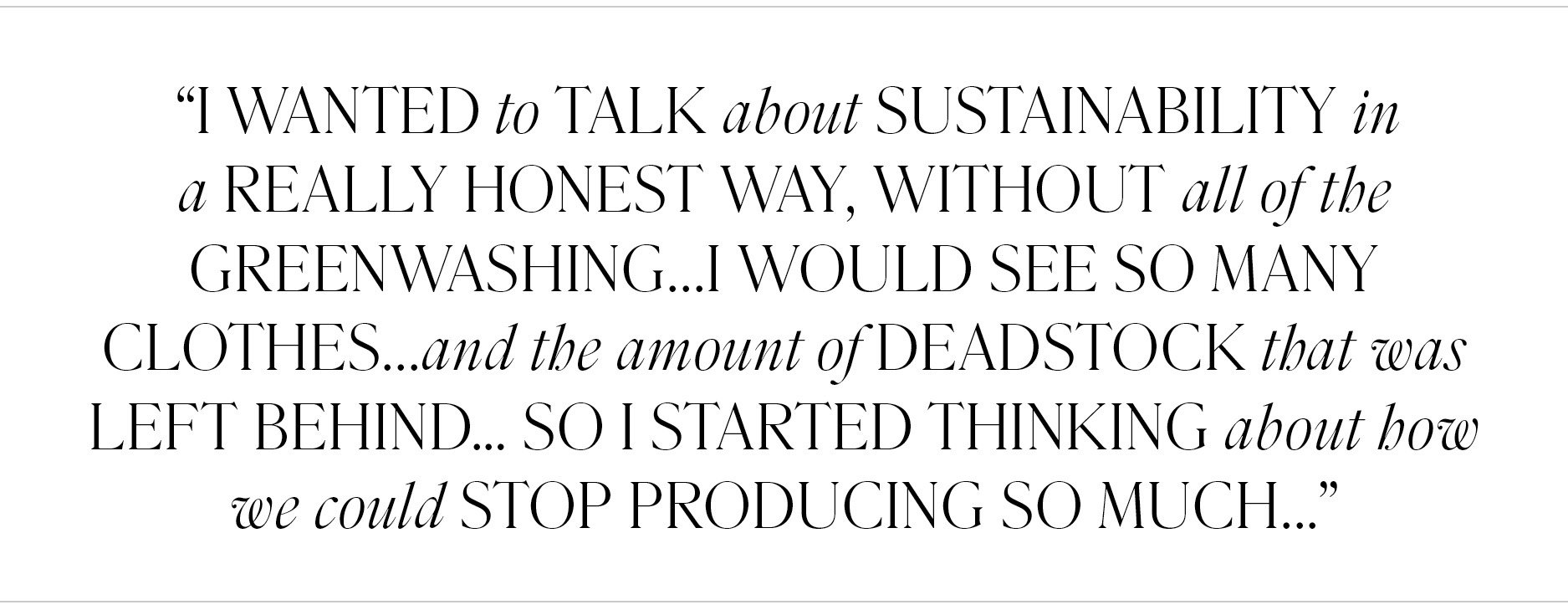
Unsurprisingly, Pelipas has big dreams for Bettter. Her “north star,” she revealed, would see Bettter open a number of R&D facilities around the world, each of which would source, produce and sell their collections locally. “If the platform I build now is around much longer than I am, and inspires people to shift the way they produce and consume and the way they think, that would be amazing. But we need to grow more before we get there,” she clarifies.
I wonder how Bettter has fared in the face of the ongoing conflict. “Seventy percent of the team left Ukraine,” Pelipas says, “and the thirty percent who remained, absolutely refused to leave.” For Pelipas, not only did the start of the war mean the necessary shut-down of Bettter’s ability to produce and sell, it also meant a fracturing of her team, as she shifted to putting their wellbeing as her first priority and thinking about how the platform she had worked so hard to build could become useful in other ways. “My team is like my family,” she explains, “and even when we didn’t have any sales, I continued to pay full salaries.” It was during the early days of the war that Pelipas realised the critical importance of creative work, not only for the sense of purpose it offered, but because, as she says, it was healing.
“I just realised that we had to keep moving forward… once you stop, you’re lost” she tells me, with a hint of that steely determination that has long underpinned her success. “So we did this pivot at Bettter and we created Bettter.Community as a way to support creatives in Ukraine.” Tapping into her vast, global network of brands, designers and publishers, Pelipas transformed Bettter’s platform into a database of talented, Ukrainian creatives in a bid to get them work and money. “When I was in Paris for fashion week I had all these people from my old life asking how they could help and I realised that we needed a very clear, transparent structure that would help them direct their support into something meaningful,” she says. “I know so many young, talented creatives and it’s so easy for them to get lost in the system, especially during wartime… So this way, not only were they able to be financially supported but I think the process of being on a shoot or creating again allowed them… allowed all of us… to temporarily forget about all the horrible things that were happening.”
Now, Bettter.Community has merged with Given Name (who will take on more of the administrative responsibilities of artist management), to become more of an official agency and continue in its quest of supporting and uplifting Ukrainian creatives globally, while Bettter resumes its original work.
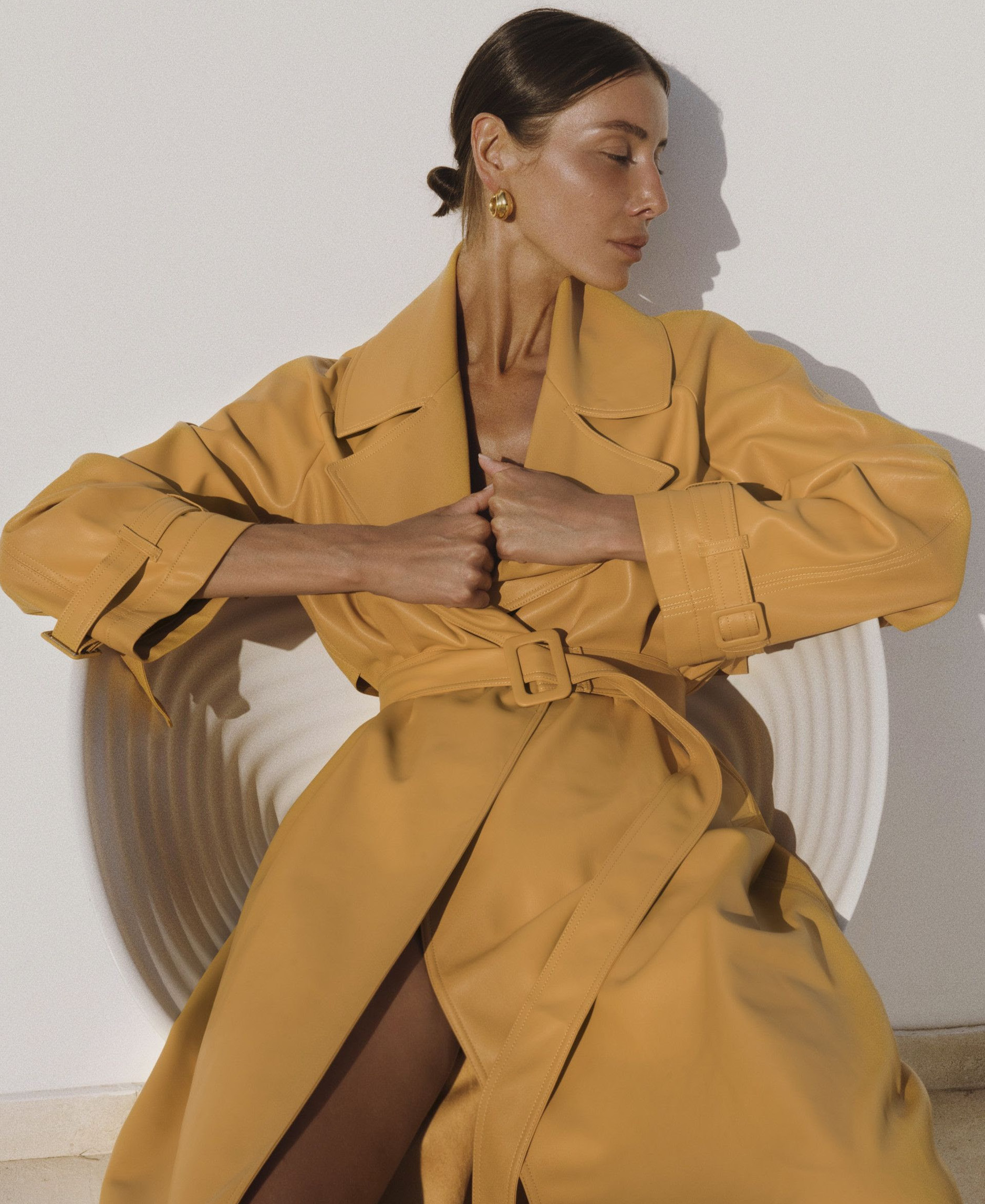
“I had relocated most of the Bettter team to Portugal, where we had set up an R&D facility and found some great production locally,” Pelipas explains, “but a few weeks ago, we actually made the unexpected decision to reopen our facility in Kyiv, with most of my team telling me how, in spite of everything, they just want to go home.” Having recently undertaken a collaborative pop-up in Paris’ Dover Street Market (in which Bettter’s MRIYA collection was unveiled via an immersive VR experience) and with Pelipas revealing a number of new collaborations in the works, it would seem that Bettter is on the brink of big things. “This is just a new chapter for Bettter,” she says, “it’s becoming more about collaborating with other brands and doing drops together… it feels new and exciting, and while there are so many challenges at the moment, I feel optimistic… I’m a very optimistic person.”
Indeed, the fact that Pelipas manages to hold onto her positivity even in the face of such gruelling circumstances is a testament to her spirit — what she would call “the mystery of the Ukrainian soul.” And while it’s obvious that she is incredibly hard-working and clearly cares about her country and countrymen, what strikes me most about her is her deep authenticity. It is rare to encounter someone with such a strong sense of self and an intuition that seems to have never led her astray. Her creative inspiration, she tells me, comes from a place within her that she can’t quite pinpoint (“my father told me once that I have a connection with the universe,” she says laughing) and when she was working her way up the ranks at Harpers Bazaar, on the brink of a big promotion, she fell pregnant and took two years off to live in Bali and enjoy time with her baby. “It was the smartest decision I ever made,” she says. “My advice to anyone is that if you’re talented, if you have brains, you will always be able to come back and build your career at any time… but it’s only a few times in your life that you have babies… to me it
was very important.”
Pelipas has a track record of doing what she knows in herself to be right. Recently, she was involved in styling Ukrainian first lady Olena Zelenska for Vogue’s October digital cover — a powerful portrait of wartime leadership, shot by Annie Leibowitz. The photographs sparked a backlash, with some claiming they glamorised war and others bristling at the juxtaposition of Vogue (and its elitist connotations and past editorial missteps) with the realities that so many are facing in Ukraine right now. That said, most critics missed the crucial nuance of the shoot; the powerful image it portrayed of strength and leadership in the face of conflict, and the platform it gave the Ukrainian designers that Zelenska was wearing, their names listed simply below each image. More than any of that, it lent the war a human face and thrust Ukraine back into the international conversation, just as mainstream coverage seemed to be dwindling. As Vanessa Fridman wrote for The New York Times, “is the magazine romanticising war, or is the first lady weaponising glossies?”
“Spreading the word really works,” Pelipas tells me, “it’s the only benefit of social media… use it to talk about the truth, because if there is silence then nothing will change.” With Ukraine’s economy predicted to shrink by 45.1 percent this year and Russian forces having already damaged an estimated $105.5 billion worth of infrastructure, both those still living in Ukraine and those supporting from afar are painfully aware of the difficult road ahead. As Pelipas explains, this war is more than just a territorial or ideological conflict. It is a battle for the soul of Ukraine and for its independence from a neighbour who wants to rewrite history. “I do have hope that something extraordinary can come out of this,” Pelipas says, “but we have to win the war… a Ukrainian victory will be a win for humanity, for light over darkness.” As far as what the rest of us can do to help, Pelipas points to the significant impact just a small donation can make. “Every day we wake up and donate what money we can, and in the end, that becomes an important part of the Ukrainian effort… it literally saves lives.”
Having recently stepped back from her social media after months of relentlessly posting about the hardships being faced by the country she loves so much, Pelipas is finally taking some time for herself. Time, I hope, she uses to recharge her creative battery and return with the kind of purpose that has long been a driving force in her life.
Whatever she does next, Pelipas’ career proves the power of fashion far beyond its glossy facade. Scratch the surface and it is about community, people and creating a path for the future. A future that, to those like Julie Pelipas, is full of hope and potential.

